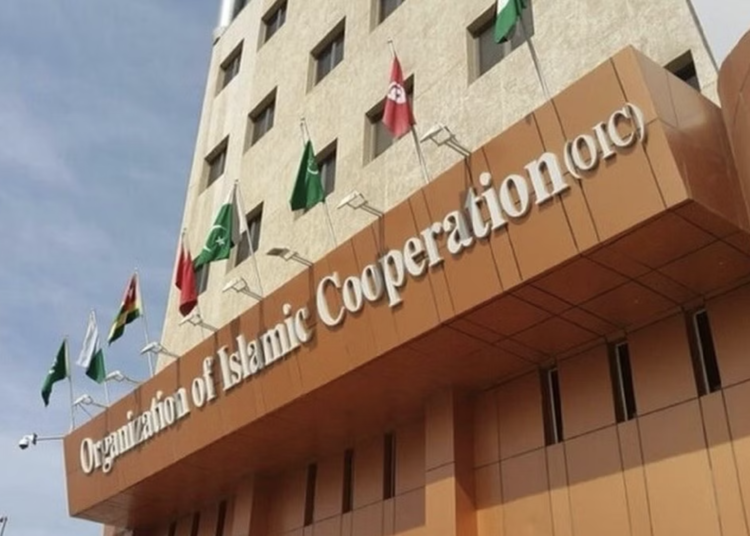The convocation of the leaders within the Organization of Islamic Cooperation (OIC) is poised to take place tomorrow on Saturday evening in Riyadh, coinciding with the other diplomatic attempts to stem the Israeli assaults on Gaza Strip inhabitants which, to this point, have not met with success.
At a regional scale, neither the Persian Gulf Cooperation Council nor the Arab League’s summits bore fruit, and, tellingly, even the conclave in Cairo was unable to issue any statement in condemnation of these transgressions in the presence of Arab chieftains. Internationally, set apart from the non-legally binding resolution adopted by the United Nations General Assembly, there is a conspicuous absence of a universal initiative to cease the conflict, leaving three pertinent drafts regarding the warfare lingering indecisively in the United Nations Security Council.
Parallel to international endeavors faltering, the US Secretary of State has been actively engaged in vigorous shuttle diplomacy to further Washington’s agenda concerning Palestine, a strategy underpinned by the sidelining of Hamas from the Palestinian political firmament and the legitimization of the Israeli regime’s conduct in the reoccupation of Gaza. Against this backdrop, the imminent conference of governmental heads from Islamic nations is touted as the most consequential regional and supra-regional forum that can put forth a vigorous support of Palestine.
Yet the crux of the matter, on the threshold of this meeting, lies in discerning the expectations assigned to the Organization of Islamic Cooperation, and whether a somber statement from the attendant parties should be deemed sufficient to address the Palestinian narrative. To shed light on this conundrum, it is instructive to hark back to the 1992 incident when, concurrent with the Serbian transgressions against Muslims in Bosnia, the Bosnian populace’s right to a legitimate self-defense was upheld, upon Iran’s proposal at the OIC. The practical manifestation of this legal triumph was evident as Islamic nations intervened to safeguard the Bosnian Muslims’ inalienable self-defense rights, even going so far as to arm them in their resistance against the Serbs.
Today, the same imperative resurfaces, that of affirming the right of Gaza’s people to a legitimate self-defense, which could constitute the crux of the Organization of Islamic Cooperation’s agenda for Gaza. Of significance is the fact that, in stark contrast to Western officials’ postulates, particularly those voiced by the US Secretary of State, regarding Israel’s entitlement to a self-defense, this regime, owing to its occupying character, cannot extrapolate its actions as self-defense, thereby rendering this legal denomination unsuitable to an occupying entity.
The subsequent item on the Islamic leaders’ meeting agenda in Riyadh could delve into the sanctions to be imposed on Israel by Islamic nations, as previously outlined by Hossein Amirabdollahian, Iran’s foreign minister, during the meeting conducted by foreign ministers a previous month. This proposal has historical substantiation, dating back to 1973 when Arab Muslim nations exploited this stratagem to levy significant pressure on both Israel and the United States.
Worth noting is that over 60% of Israel’s diesel is routed via the Baku-Tbilisi-Ceyhan pipeline, a system reliant on Islamic countries. As per data, Israel’s total refining capacity across its Haifa and Ashdod refineries approximates 300,000 barrels per day, sustained largely by oil imports from Organization of Islamic Cooperation member countries such as Kazakhstan and Azerbaijan.
Furthermore, Egypt, erstwhile leader in resistance against Israel, has pivoted to become this regime’s prime trade partner, evolving into a gas importer from Israel since 2019. At present, Egypt receives 5 billion cubic meters of gas through the EMG pipeline, accounting for about 8% of its total consumption.
Jordan and Turkey are among the additional Islamic countries with substantial economic ties to Israel, thus, cutting off economic relations with Israel in response to the daily slaughter of the people of Gaza is the least expected outcome from these countries on Saturday.
The meeting on Saturday should transcend trite declarations and it should not suffice to only requesting a ceasefire, lifting the blockade, condemning land incursions, exchanging prisoners, and sending humanitarian aid to Gaza. Even though, halting the attacks against the people of Gaza, providing urgent and continuous humanitarian aid to this embattled region, and halting the forced displacement of civilians in Gaza are among pressing demands that ought to be emphasized in the statement of the summit, along with the aforementioned components.
If success is achieved in recognizing the Palestinians’ right to self-defense and implementing economic sanctions against Israel, not only will it be a significant political and historical victory for Palestine, but it will also be a notable achievement for Muslim nations, which would lead to the formation of a robust political and economic bloc in a rapidly changing world.
Iran can play a significant role in achieving these goals. Historically, the OIC has also sought to support Palestine. Moreover, while some Arab countries may seek to downplay Iran’s role in the Palestinian issue, Iran’s position within the organization as one of its founders cannot be disregarded.






